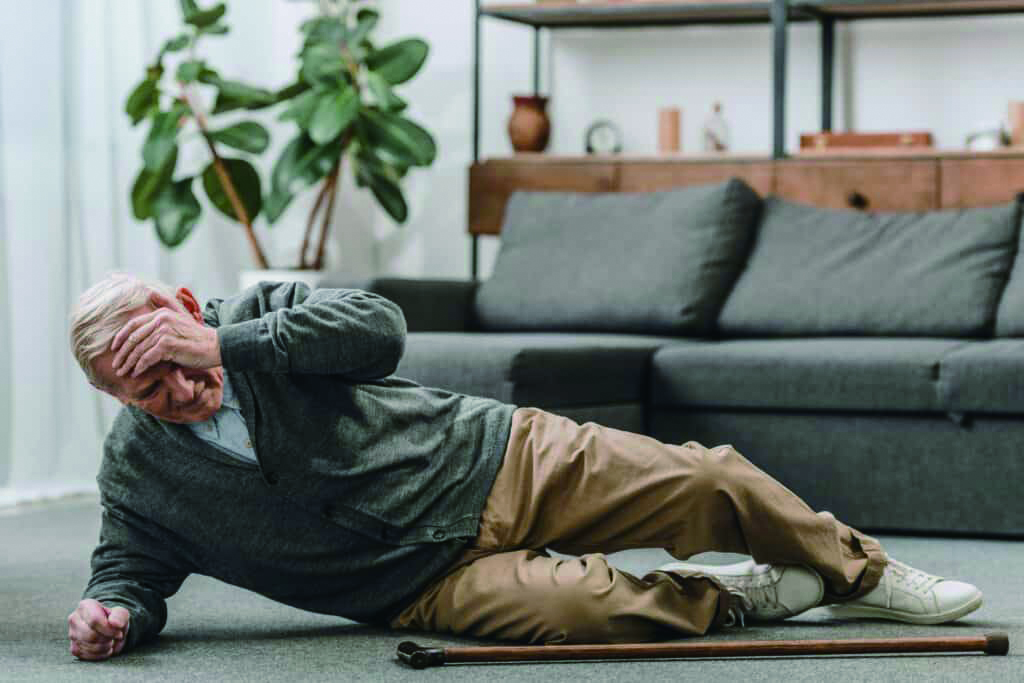[Wanqingyi Care]Obese and smokers are at high risk of stroke, like a storm blowing in the brain
[ad_1]
Text ◆ Leong Man Hock (gerontologist), “Ming Pao”
An experience I had when I was in primary school left a deep impression on me about the three words “burst blood vessel.” Later, when I was studying medicine, I realized that stroke is a disease of the cerebral blood vessels, causing blockage or bursting.
If the blood supply to the brain is suddenly interrupted, brain cells and tissues will die, and body functions will not function normally.
(Hong Kong News) A storm came uninvited and left everything devastated after it hit.
I’m talking about: stroke sufferers. They are like being hit by Typhoon No. 10, and they often cannot escape. After the attack, the road to recovery is slow and long, and perseverance and confidence are indispensable, and it is even more valuable to work together on the journey. I once witnessed a patient collapse after a stroke. Unfortunately, at the time, I had no idea what a “stroke” was, let alone how to deal with it.

Stroke symptoms vary
The fifth grade mathematics teacher in elementary school is named “Fei Zhu Sir”. He was a kind-hearted person and didn’t seem angry even when he found out that a student put the word “fat” in front of his last name. I remember one day, Sir Fat Zhu listed an equation on the blackboard as usual, and then asked the students to do the math. It happened to be my turn that time, and just as I was trying to calculate, I suddenly heard a loud “crack” sound, which really frightened me for a while.
In shock, I saw Sir Fat Zhu falling to the ground. His eyes turned white and white pop balls came out of his mouth. Although the spit looks a bit like cream bubbles, it still looks scary.
Especially when I heard the classmates exclaiming in the background: “Wow!”
Or maybe I was so scared at the time that all my memories of the rest of that day disappeared. Did Mr. Zhu walk out of the classroom on his own or was he carried away? Did I finally write the answer on the blackboard? Is the answer accurate? How long did the class last for that day? Are any students so scared that they cried due to unexpected situations? I can’t answer any of these questions. The memory ends here.
However, there is one sentence that I remember to this day. The substitute teacher said: “You are so naughty and stupid. Sir Zhu is so angry with you that his blood vessels burst!”
It turns out that Sir Fat Zhu had a blood vessel burst that day. Since then, I have been deeply impressed by the three words “exploding blood vessels”.
However, much later, when I was taking an internal medicine class in medical school, I realized that what Sir Zhu was suffering from was actually a “stroke”.
A stroke is a disease in a blood vessel in the brain, causing blockage or bursting. If the blood supply to the brain is suddenly interrupted, brain cells and tissues will die, and body functions will not function normally.
Stroke symptoms can vary, but they are generally painless and sudden.
Some serious symptoms can pose an immediate life-threatening risk, but some mild symptoms can be fleeting and make people take it lightly. Common stroke symptoms include: hemiplegia, slurred speech, crooked mouth, squinting eyes, difficulty swallowing, incontinence, numbness, and drooling.
In severe cases, it can lead to coma or death. From this point of view, I believe that Mr. Fat Zhu belongs to the latter, because he was unconscious that day!
People with diabetes are 6 times more likely to have a stroke
However, when it comes to the causes of stroke, I suspect that Sir Zhu’s obesity may be one of the causes. The medical community has learned about many high-risk factors for stroke, including advanced age, high blood pressure, smoking, diabetes, high cholesterol, obesity, heart disease, atrial fibrillation and lack of exercise. So obesity definitely plays a role.
It is said that diabetes and obesity have become the number one epidemic in developed areas. Hong Kong is certainly no exception.
BMI (body mass index) is weight divided by height squared and is commonly used as a measure of obesity. Generally, a BMI of 23 or above is considered overweight, and a BMI of 25 or above is considered primary obesity. A survey report by the Department of Health pointed out that more than 30% of people in Hong Kong are overweight or obese, and the weight of Hong Kong people is increasing year by year. This trend is actually not optimistic, because obesity can cause trouble.
A thick waist and body fat reflect high levels of visceral fat. Having too much fat is not something to be thankful for, because it is a risk factor for cardiovascular and cerebrovascular diseases. The higher the visceral fat content, the more likely it is to cause cardiovascular and cerebrovascular diseases affected by metabolism.
In addition, obesity and diabetes are also closely related. With changes in eating habits, the proportion of many people suffering from diabetes is increasing, and it is estimated that it will increase from 8.8% to 12.8% in the next 20 years. Another study shows that when other high-risk factors are excluded, the risk of stroke in people with diabetes is 2 to 6 times higher than that of the general population. Therefore, it is very important to control your weight; it is best to maintain a standard weight and never become overweight.
However, looking at the high-risk factors for stroke, we must not underestimate hypertension. Research shows that, calculated from 115 (systolic blood pressure)/75 (diastolic blood pressure) mmHg, for every 20 (systolic blood pressure)/10 (diastolic blood pressure) mmHg increase in blood pressure, the mortality rate from vascular disease will double. Therefore, it is important to prevent stroke. In other words, it is very important to control systolic and diastolic blood pressure. Elderly people generally suffer from high systolic blood pressure, so treating high blood pressure can greatly reduce the risk of stroke.
Lowering cholesterol reduces risk
But in reality, patients often ignore the severity of hypertension. It is generally believed that as age increases, blood pressure will naturally increase. As for the elderly, there is no problem if the blood pressure is slightly higher.
Some patients said: “Oh, it’s just that the reading on the blood pressure monitor is higher than the standard; but I have no symptoms, no discomfort at all. Why do I need to take medicine? Doctor, I don’t like taking these chemicals into my stomach!” More The patient said: “I took the medicine for a week and my blood pressure has dropped. Now that everything is back to normal, I naturally no longer need to take medicine!”
Unfortunately, under the influence of hypertension, cardiovascular and cerebrovascular diseases are complicated. At that point, treatment becomes doubly difficult. Therefore, it is best for us to develop the habit of regular physical examination and blood pressure measurement. The saying goes that prevention is better than cure. Moreover, high blood pressure is not limited to the elderly. Even young and middle-aged people can suffer from high blood pressure. Just because the early symptoms are not obvious, and everyone thinks that hypertension is an old man’s disease, they don’t pay attention to it at all; they don’t know how to check, take medicine, and adjust their diet.
Therefore, when a stroke strikes, it is even more unexpected and at a loss.
One of the risk factors for stroke is cholesterol. Cholesterol, especially low-density cholesterol, can form arteriosclerotic plaques if the concentration is too high. Plaque rupture can directly induce the pathological mechanism of stroke. Medical research has confirmed that cholesterol is the main component causing atherosclerosis. Lowering cholesterol can effectively reduce the risk of stroke. Therefore, if the blood test report shows that LDL cholesterol is high, it is best to consult a doctor and take appropriate medications to reduce the cholesterol concentration.

Regular work and rest, control of diet, moderate exercise Regular physical examination to prevent stroke
After examining the factors, we found that many of them are related to nurture. For this reason, doctors and nurses will carefully warn patients that it is best to take more precautions.
First of all, we must pay attention to health and control various high-risk factors such as high blood pressure, diabetes, high cholesterol, and atrial fibrillation.
In terms of diet, you must quit smoking and drinking, reduce salt intake, avoid eating too many fatty or sweet foods, and eat more fiber-rich foods such as green leafy vegetables and fruits.
In terms of life, you should keep a regular schedule, get enough rest, do moderate exercise and persevere, maintain a suitable weight, and try to avoid obesity.
Regular physical examinations are also important. If there is a family history of high blood pressure or heart disease, we should have regular heart examinations, including X-rays, electrocardiograms, and cardiac ultrasound examinations. Early detection of symptoms will naturally greatly reduce the risk of stroke. Developing the habit of regular self-monitoring and measuring changes in blood pressure and blood sugar is an economical, convenient, effective and direct approach.
These instructions may be a bit long-winded, but if we want to live healthy, age wonderfully, and live happily, we’d better follow them as much as possible, take good care of our bodies, and be happy people.
[ad_2]
Source link

![[Love Wants Sexual Happiness Series 358]Find the culprit and overcome psychogenic erectile dysfunction. Don’t let pressure affect your sexual happiness.](https://chinathenews.com/wp-content/uploads/2024/04/171111-780x420.jpg)

![[Wanqingyi Care]My health, my rights, customized medical methods in the last stage of life](https://chinathenews.com/wp-content/uploads/2024/04/ZZ1-100-780x420.jpg)
![[Kidney Transplantation Special Topic]The survival rate of transplanted kidneys is high without dialysis treatment three times a week](https://chinathenews.com/wp-content/uploads/2024/04/1311-780x420.jpg)



